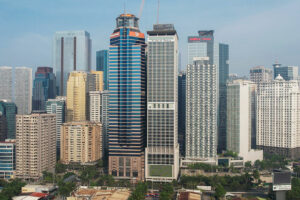




Philippines Trade Update: Trade trajectories trend along
 DOWNLOAD
DOWNLOAD

Policy Rate Updates: Double cut finale
 DOWNLOAD
DOWNLOAD

Monthly Economic Update: One for the road
 DOWNLOAD
DOWNLOAD


Debates on economic ‘Cha-cha’ begin

The Department of Finance (DoF) on Monday asked Philippine lawmakers to ease foreign ownership limits in the 1987 Constitution for key sectors such as public utilities, mining, education, mass media, and advertising to attract more investments.
But the government of President Ferdinand R. Marcos, Jr. should keep land ownership exclusive to Filipinos and Filipino-owned companies, Finance Undersecretary Zeno Ronald R. Abenoja told the House of Representatives Committee of the Whole at a hearing on Monday.
“This effort to fully liberalize and lift such restrictions (will) contribute to a policy environment that will make the economic regime more adaptable and responsive to current social and economic realities,” he said.
The Philippines is hard-pressed to attract foreign direct investments to boost capital flows and finance development projects amid weak infrastructure, high energy costs, complex regulations, and political instability that make it the least attractive destination in Southeast Asia.
“The whole intention of opening up the economy is to introduce more dynamism in the economy, better access to technologies and know-how, and improve our productivity,” National Economic and Development Authority (NEDA) Secretary Arsenio M. Balisacan separately told BusinessWorld on the sidelines of the hearing.
Congressmen on Monday began deliberations on the House Resolution of Both Houses No. 7, which proposes to lift economic restrictions on the ownership of public utilities, educational institutions, and advertising.
It proposes to insert the phrase “unless otherwise provided by law” in Articles 12, 14, and 16 of the Constitution, which restricts foreign ownership in these sectors.
“The DoF is proposing the insertion of the phrase ‘unless otherwise provided by law’ to the provision on the public utilities as well as the nationality requirement for co-production, joint venture or production sharing for the exploration, development, and utilization of natural resources, as in the case of mineral resources,” Mr. Abenoja said.
The Constitution currently mandates the state protect Filipino enterprises against unfair foreign competition and trade practices, and limits land ownership to Filipino citizens and corporations that are at least 60% Filipino-owned.
Mr. Abenoja said the DoF also recommended including the phrase in the Charter for the “outright deletion” of restrictions on foreign investment in the sectors of mass media, educational institutions, and advertising.
NEDA’s Mr. Balisacan said amending the Constitution’s economic provisions would help the Philippines achieve its goal of reducing the poverty rate to a single-digit level by 2028.
“The NEDA believes that no less than massive amounts of investments in both physical and social infrastructure, as well as human capital, are needed to attain such a feat… We must lift restrictions on critical sectors such as public utilities, education, mass media, and advertising so that we can realize their untapped potential and enable them to contribute to the country’s economic progress,” he told lawmakers.
Mr. Balisacan said opening up the public utilities sector to foreign investors would improve water and energy distribution, as well as address financing gaps in infrastructure.
“In the education sector, this initiative will ensure that Filipinos can access global knowledge, skills, and technology that can nurture a culture of innovation, positioning the Philippines as a competitive hub for knowledge exchange in the region,” he said.
Mr. Balisacan said foreign investments in mass media would increase the global profile of local media, as well as allow the industry to modernize and expand.
Amending the Charter would allow Philippine laws to keep up with developments in the global economy, Monetary Board member Romeo L. Bernardo said.
“Reducing, if not removing restrictive provisions, will facilitate an increase in foreign capital investment and hasten the growth of the economy which in turn can expedite the ability of the nation to realize inclusive economic growth,” Mr. Bernardo told congressmen.
For his part, Foundation for Economic Freedom President Calixto V. Chikiamco said the Philippines is the only country that details economic restrictions in its Constitution.
“Eliminating the restrictive economic provisions in the Constitution is also necessary to allow for greater flexibility and agility in policy making so we can adapt to evolving economic needs and realities in both domestic and global settings,” Mr. Chikiamco told the committee.
However, NEDA’s Mr. Balisacan said Charter change (Cha-cha) is only a “complementary strategy” in unlocking the country’s economic potential.
“To be sure, this initiative will not solve all our economic ills… Let me emphasize that we only reap the benefits I mentioned if we also address the other problems involving energy costs, inadequate connectivity infrastructure, slow bureaucratic processes, inconsistent local and national regulations, and highly concerning learning poverty and malnutrition,” he said.
“Conversely, a policy environment promoting openness to foreign investment can exert more significant pressure on the government to urgently address the complex challenges.
IBON Foundation executive director Jose Enrique A. Africa opposes economic Charter change, telling lawmakers that it is unnecessary.
“If we change the Constitution, we will be losing legal leverage precisely for the same kind of protective industrial policies that other countries are doing today, including advanced countries like the United States, EU (European Union), Japan, China, and many other countries,” Mr. Africa said.
Meanwhile, Senate President Juan Miguel F. Zubiri said President Ferdinand R. Marcos, Jr. wants a Charter change plebiscite to be held at the same time as the 2025 midterm elections. – Beatriz Marie D. Cruz, Reporter
This article originally appeared on bworldonline.com





 By BusinessWorld
By BusinessWorld